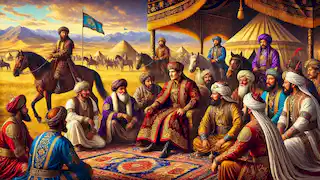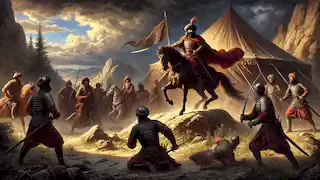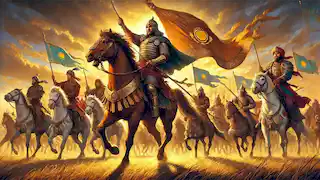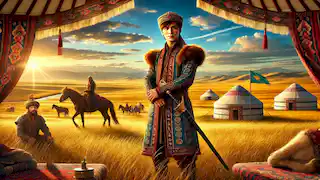In the boundless expanse of Kazakhstan, where the golden steppe meets the endless blue sky, a hero rose to shape the destiny of his people. Bakhtiyar Khan, a name etched in the annals of history, was a leader of unparalleled vision and courage. His journey, beginning from humble roots in a nomadic tribe, culminated in the unification of disparate clans into a single, powerful force. This is the story of his life, a saga of struggle, determination, and triumph. The Kazakh steppe is a land of contrasts—scorching summers, frigid winters, and an ever-changing sky. For centuries, its people lived as nomads, moving with their herds and following the rhythm of nature. These tribes shared a rich heritage of storytelling, music, and traditions passed from one generation to the next. Yet, they were also divided, often warring with one another over resources and territory. It was into this world that Bakhtiyar was born. His story begins in the shadow of the Tian Shan mountains, under a canopy of stars that seemed to whisper promises of greatness. Bakhtiyar’s early years were filled with the simple joys and harsh realities of nomadic life. His father, Arslan, was a warrior of great renown, and his mother, Aizada, a wise and compassionate matriarch. Together, they raised their son to respect their traditions and understand the balance between strength and wisdom. Even as a boy, Bakhtiyar displayed a remarkable ability to mediate disputes among his peers. His natural charisma and quick thinking made him a favorite among the elders, who often said, “This boy has the spirit of a leader.” However, his idyllic childhood was shattered one spring when raiders attacked their camp. It was a brutal assault, with fires consuming the yurts and livestock scattered into the wilderness. Bakhtiyar, barely twelve years old, watched helplessly as his father fought valiantly to protect their people. Though Arslan survived, the tribe suffered devastating losses. In the aftermath, Bakhtiyar vowed to never again allow his people to be so vulnerable. That night, as he stood beneath the vast, starlit sky, he made a silent promise to unite the tribes and bring strength and stability to the steppe. Bakhtiyar’s teenage years were a crucible of learning. Determined to prepare himself for leadership, he immersed himself in the teachings of the elders and the warriors of his tribe. He learned to ride with unmatched skill, wield a blade with precision, and command the respect of those around him. His mother, Aizada, played a crucial role in shaping his character. She often recounted the ancient legends of their people, stories of heroes who triumphed against insurmountable odds. These tales instilled in Bakhtiyar a deep sense of purpose and connection to his heritage. By the age of twenty, Bakhtiyar had already distinguished himself as a capable leader. During a particularly harsh winter, he orchestrated a daring raid to reclaim stolen livestock from a rival tribe, ensuring the survival of his people. This act of bravery earned him the respect of his tribe and the attention of other clans. The political landscape of the Kazakh steppe was fragmented. Tribes operated independently, often clashing over grazing lands and trade routes. Bakhtiyar recognized that unity was essential not only for survival but also for prosperity. His vision was ambitious: to forge a confederation of tribes that would stand as one against external threats and internal discord. Bakhtiyar began his campaign for unification by reaching out to neighboring tribes. He visited their leaders, presenting his vision of a united Kazakh identity. His approach was both diplomatic and strategic. To some, he offered alliances sealed by marriage or trade. To others, he demonstrated the strength of his warriors in carefully calculated skirmishes. Not all tribes welcomed his overtures. Some saw him as a threat to their autonomy, while others were manipulated by foreign powers seeking to exploit the steppe’s divisions. Bakhtiyar faced his first major challenge when a coalition of rival tribes launched an attack on his growing confederation. The battle was fierce, but Bakhtiyar’s strategic brilliance and the loyalty of his followers led to a decisive victory. This triumph solidified his reputation as a formidable leader. As Bakhtiyar’s influence grew, so did the challenges he faced. One of the most harrowing moments of his journey came in the form of betrayal. A trusted ally, swayed by promises of wealth from a rival khan, conspired to capture Bakhtiyar during a diplomatic meeting. The plot was uncovered just in time, thanks to the vigilance of Bakhtiyar’s closest advisors. Though he narrowly escaped capture, the betrayal shook him deeply. It was a painful reminder of the complexities of leadership and the necessity of vigilance. Rather than succumbing to despair, Bakhtiyar used the experience to strengthen his resolve. He tightened his inner circle, placing his trust only in those who had proven their loyalty through action. This episode became a turning point in his leadership, marking the beginning of a more cautious and calculated approach to governance. After years of relentless effort, Bakhtiyar’s dream of unification became a reality. The Kazakh tribes, once fragmented and at odds, now stood together as a powerful confederation. This newfound unity brought stability to the steppe, allowing trade and culture to flourish. Under Bakhtiyar’s leadership, a network of trade routes was established, connecting the steppe to distant markets in China, Persia, and Russia. These routes not only brought wealth but also facilitated the exchange of ideas, technology, and art. The steppe, once seen as a desolate frontier, became a thriving center of commerce and culture. Bakhtiyar also prioritized education and the preservation of Kazakh traditions. He invited scholars and artisans to his court, fostering a cultural renaissance that celebrated the richness of their heritage while embracing new innovations. In his later years, Bakhtiyar turned his attention to securing the future of his people. He established a council of trusted leaders to ensure fair governance and trained his successors to carry on his vision. Though his body grew frail with age, his mind remained sharp, and his influence endured. When Bakhtiyar passed away, his people mourned deeply. They built a grand mausoleum in his honor, inscribing it with the words: “Here lies Bakhtiyar Khan, unifier of the steppe, protector of his people, and father of a nation.” His legacy lived on in the hearts of his people, inspiring generations to come. To this day, Bakhtiyar Khan is remembered as a symbol of resilience, wisdom, and the enduring power of unity.Prologue: The Song of the Steppe
The Child of the Steppe
The Forge of Experience
The Path to Unification

Betrayal and Resilience

Triumph and Prosperity

The Legacy of a Khan

Bakhtiyar Khan
Reading Time: 6 min

About Story: Bakhtiyar Khan is a Legend Stories from kazakhstan set in the Medieval Stories. This Descriptive Stories tale explores themes of Courage Stories and is suitable for All Ages Stories. It offers Historical Stories insights. One man’s courage unites a nation in the heart of the Kazakh steppe.

















